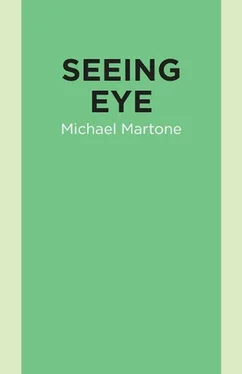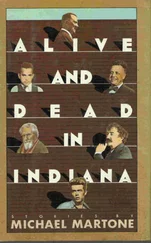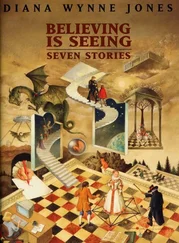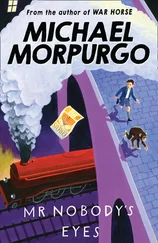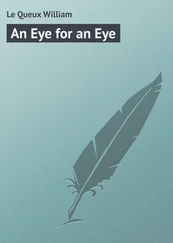Michael Martone - Seeing Eye
Здесь есть возможность читать онлайн «Michael Martone - Seeing Eye» весь текст электронной книги совершенно бесплатно (целиком полную версию без сокращений). В некоторых случаях можно слушать аудио, скачать через торрент в формате fb2 и присутствует краткое содержание. Год выпуска: 2013, Издательство: Dzanc Books, Жанр: Современная проза, на английском языке. Описание произведения, (предисловие) а так же отзывы посетителей доступны на портале библиотеки ЛибКат.
- Название:Seeing Eye
- Автор:
- Издательство:Dzanc Books
- Жанр:
- Год:2013
- ISBN:нет данных
- Рейтинг книги:5 / 5. Голосов: 1
-
Избранное:Добавить в избранное
- Отзывы:
-
Ваша оценка:
- 100
- 1
- 2
- 3
- 4
- 5
Seeing Eye: краткое содержание, описание и аннотация
Предлагаем к чтению аннотацию, описание, краткое содержание или предисловие (зависит от того, что написал сам автор книги «Seeing Eye»). Если вы не нашли необходимую информацию о книге — напишите в комментариях, мы постараемся отыскать её.
Seeing Eye — читать онлайн бесплатно полную книгу (весь текст) целиком
Ниже представлен текст книги, разбитый по страницам. Система сохранения места последней прочитанной страницы, позволяет с удобством читать онлайн бесплатно книгу «Seeing Eye», без необходимости каждый раз заново искать на чём Вы остановились. Поставьте закладку, и сможете в любой момент перейти на страницу, на которой закончили чтение.
Интервал:
Закладка:
The mural above the postmaster’s door in the lobby is being restored to the way it looked when it was painted during the Depression. Scaffolding hides most of it now. The painters move deliberately in the rigging, scooting on their backs or stomachs. It seems to me they are too close to the work. The mural is about the guide dogs. The dogs are marching, leading a parade of blind workers. In the background are ghostly Saint Bernards, Border collies, and bloodhounds, all the working dogs working. The sky rolls with clouds, the rolling hills gesture like a cursive hand. The road they walk is like a signature, too. The painter signed his name in braille, the code of bumps shaded to make it look raised on the flat wall.
In the lobby, the county association for the blind runs the news concession selling candy bars and newspapers, stationery supplies and maps of the city’s streets. They let Mabel, who mans the stand, smoke behind the counter. Her dog, a black Lab, curls around the stool, the stiff lead angling upward like a harpoon. Mabel’s eyes are a kind of nougat. She never wears glasses. Smoking artlessly, she picks the tobacco off her tongue. It stays on her moist fingers.
My final job of the day is to clear sidewalk boxes outside the station in time to make the last dispatch. She hears me blowing through the lobby with the carton filled mainly with the metered mail in bundles.
“I always know it’s you,” she says. “You walk on your toes. I can’t smell you.” She feels her watch on her wrist. “Same time every day, too.” I run through the lobby to the back with the mail. On my way out again, I stand by her stand untucking my shirt, letting myself cool down.
After weeks of this routine I say to her without thinking, “You’re the only blind person I know.” It isn’t that she looks at me, of course. The dog on the floor does look up. She pauses and cocks her head.
“You can see, can’t you?” She waits for me to answer yes, begins the elaborate ritual of lighting another cigarette. “I don’t know too many blind people either. It’s not like we run in packs.”
The Postal Service has a secret. There is only one key that opens everything. It only makes sense. We can’t be walking around with a ring of keys for all we have to open. The banks of boxes in apartment lobbies open at once with the key. The corner collection boxes. The green relay boxes. The padlocks we use. The box at the end of the glass chute between the elevators in the old hotels. Same key. In that way a substitute on the route already has all the keys needed. One key.
I guess it is not much of a secret. If you worked for the post office you know, or if you even thought about it some, you could guess. There it is at the end of that long chain. One key.
They make a big deal about the key at the office. Do Not Duplicate is stamped on it twice. I find I am always fingering the key, my hand in the pocket with it as I walk. In cross section it has an S shape. It has several deepening grooves and bristles with teeth. I want it not only to open up the boxes of the post office but to turn in every lock, a true skeleton key, opening all the houses on my route. Inside I could arrange the mail further, piles for each family member, on the marble mantel or the little table by the door. As it is, I find myself looking into houses through the mail slot, holding up the brass flap to see the slice of floor and the envelopes and flyers splayed out randomly there. I feel the cool air rush out in the summer. Adjusting my line of sight, I can see walls of framed pictures of grown children who send the postcards I’ve read from all the islands, the color envelopes thick with pictures of grandkids. Clocks hang on the walls. Coats on racks. And sometimes one of the dogs — I’ve heard it bark in the back of the house — will come clicking on the linoleum. Huffing around the corner of the entry hall, he is ready to blow the door down from the inside. A snarl and chomp. The flap on the mail slot is already back in place. That’s when that black nose points through the door, the nostrils blinking, opening and closing, trying to take in all the smells of me. The fear, the loneliness, my own secret combination of nerves.
Years after the trained dogs leave this city, after they’ve grown old and blind, their owners bring them back. They trade them in and leave with new dogs.
I’m out at the airport picking up the orange bags of overnight mail when a dog and its owner will come limping across the tarmac. One of the props of the plane they flew in on still revs while the little trucks, run on propane, weave around with baggage and fuel. The dog and the man were the last down the metal stairway, led by an attendant to the terminal. The dog’s muzzle is white. Its tongue is out, slipping off to the side of its mouth. There is no color left in the clog’s eyes. The clog’s almost blind. Its head is down. The shoulders roll. Someone from the school meets them. They wait in the van as the luggage is stowed. I can see the dog’s head for a second next to its owner. It shakes itself and collapses beneath the window.
And I sometimes read the notes on the postcards they write home while they are waiting for their new dogs, postcards of the school, a color photograph of a German shepherd at attention rigged out and ready to go. The notes are about Spike or Lady, how the dog took the flight, how the dog is off its food, how the dog seems to remember this place. The writing is little and cramped or big as if magnified. The ink smears on the coated glossy stock of the card. They always love the town, the children on the street. The new dog will take some getting used to. “Buster is making new friends with all the retired pooches.” On and on. It’s too much to bear. I read these cards and think of losing them someplace or sending them out on the wrong dispatch. They are so sad, I don’t want them sent. By the time they make it home, the writer will have returned to his or her life. “Oh that. I’d forgotten I’d sent it. It’s just what I told you.”
I read these cards in the new white trucks with the right-handed drive and no windows in the back. You have to use the mirrors to see, and everything is distorted.
My family never write but call. My mail is window mail, stamped with the odd denominations of the definitive issues, the transportation series. Each stamp is a special class. Every one’s soliciting. The stamps depict all these obsolete forms of movement. Canal boats, milk wagons, stagecoaches, pushcarts, carretas, railroad mail cars, a wheelchair with hand-cranked transmission. Bulk rates, presorted, ZIP-plus-4 discounting, carrier route sorting. When it isn’t bills, it is charity, nonprofit dunning. Tandem bicycles, steamships, dogsleds. I read my name through the plastic window on the envelope. I try not to imagine what lists I am on, what those lists say about me. My family call when they have to with important family news. “The mail takes too long to get there,” they say. I am too far away to do anything with the news I get. I sign a sympathy note or write a check during the commercials on TV.
I get other calls in the evening or in the morning as I am dressing for work. I answer, and there is silence on the line for a second or two, then the disconnection. This happens often. I shout hello, hello into the static. I can’t seem to not answer the telephone. You never know. It could be news. For a while I just picked up the phone without saying a word, listened hard to the silence and then the line going dead. I have to sort my route first thing in the morning. I go to bed early. In the dark the phone rings. I let it ring for a long time. When I answer it, there is that moment of silence and that soft click. Just checking. Just checking. There is nothing to be done. I leave the phone off the hook and wait through the warning alarms of the phone company, the recorded message telling me to replace the phone in its cradle. And then even that gives up.
Читать дальшеИнтервал:
Закладка:
Похожие книги на «Seeing Eye»
Представляем Вашему вниманию похожие книги на «Seeing Eye» списком для выбора. Мы отобрали схожую по названию и смыслу литературу в надежде предоставить читателям больше вариантов отыскать новые, интересные, ещё непрочитанные произведения.
Обсуждение, отзывы о книге «Seeing Eye» и просто собственные мнения читателей. Оставьте ваши комментарии, напишите, что Вы думаете о произведении, его смысле или главных героях. Укажите что конкретно понравилось, а что нет, и почему Вы так считаете.
